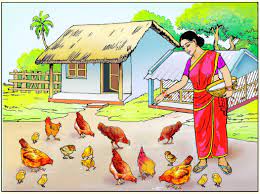Indian Women in Back yard Poultry Farming
Dr. Sachin Uttamrao Raut
M.V. Sc. (Surgery & Radiology), Ph.D., PGDIT, PGDYE, PGDRM,DIT, DYT, DGD, Diploma in Psychology, Diploma in Journalism
Backyard poultry farming refers to the practice of raising chickens, ducks, or other poultry birds in one’s own backyard or a small-scale setting. It is an increasingly popular activity among women in both urban and rural areas. Backyard poultry farming offers numerous benefits, such as a source of fresh eggs and meat, a means of self-sufficiency, and even a potential income-generating opportunity. For women, backyard poultry farming can provide an avenue for empowerment, economic independence, and improved livelihoods. It allows them to actively participate in agricultural activities, contribute to household nutrition, and generate additional income for their families. This form of farming offers flexibility, as it can be managed alongside other household responsibilities, making it particularly suitable for women who may have limited time or mobility.
One of the key advantages of backyard poultry farming is its relatively low start-up cost and manageable scale. It does not require vast land or sophisticated infrastructure, making it accessible to women with limited resources. Additionally, poultry birds reproduce relatively quickly, providing a regular supply of eggs or meat for consumption or sale.
Economic empowerment:
Backyard poultry keeping provides women with an opportunity to contribute to the household income. By selling eggs, meat, or even live birds, women can earn additional income, which can be used for their own needs or invested in education, healthcare, or other family expenses. This economic empowerment enhances their status within the household and community.
Skill development:
Keeping chickens enables rural women to gain essential knowledge and abilities in marketing, management, and animal care. They learn how to correctly feed the birds, take care of them, and recognize common illnesses and how to treat them. These abilities can be applied to other methods of raising livestock, expanding the possibilities for making money.
Improved nutrition:
Backyard poultry keeping can significantly contribute to improving the nutritional status of rural families. The availability of fresh eggs and meat provides a valuable source of high-quality protein, vitamins, and minerals, which are often lacking in the diets of rural populations. Women can ensure that their families have access to nutritious food by managing their own poultry units.
Empowerment and decision-making:
Rural women get a sense of ownership and control over productive assets by taking up poultry rearing. They take charge of making decisions on flock management, feeding procedures, and advertising tactics. Their stronger status within the family and community as a result of their increased involvement in economic activities promotes empowerment and gender equality.
Community networking:
Backyard poultry keeping can promote community networking among rural women. They can form self-help groups or cooperatives to share knowledge, resources, and marketing opportunities. Collective efforts can lead to better access to markets, bulk purchasing of inputs, and shared veterinary services. Such networking also provides a platform for social interactions and mutual support.
Building capacity and providing support:
Government agencies, non-governmental organizations, and other groups frequently offer training and assistance to rural women in poultry management. Their technical proficiency, understanding of better poultry practices and access to market information are all boosted by these activities. To ensure long-term success, capacity-building programs also emphasize the promotion of sustainable practices, disease prevention, and financial literacy.
Overcoming challenges:
Rural women engaged in backyard poultry keeping may face challenges such as limited access to veterinary services, lack of capital, and social norms. However, with appropriate training and support, they can overcome these challenges. Collaboration with local government agencies, NGOs, and women’s self-help groups can help address these issues effectively.
Backyard poultry keeping in rural areas among women not only contributes to household income and nutrition but also plays a vital role in women’s empowerment and community development. By recognizing and supporting their efforts, rural women can become catalysts for positive change in their families and communities.
BACKYARD POULTRY REARING AS A TOOL IN POVERTY REDUTION IN RURAL INDIA


